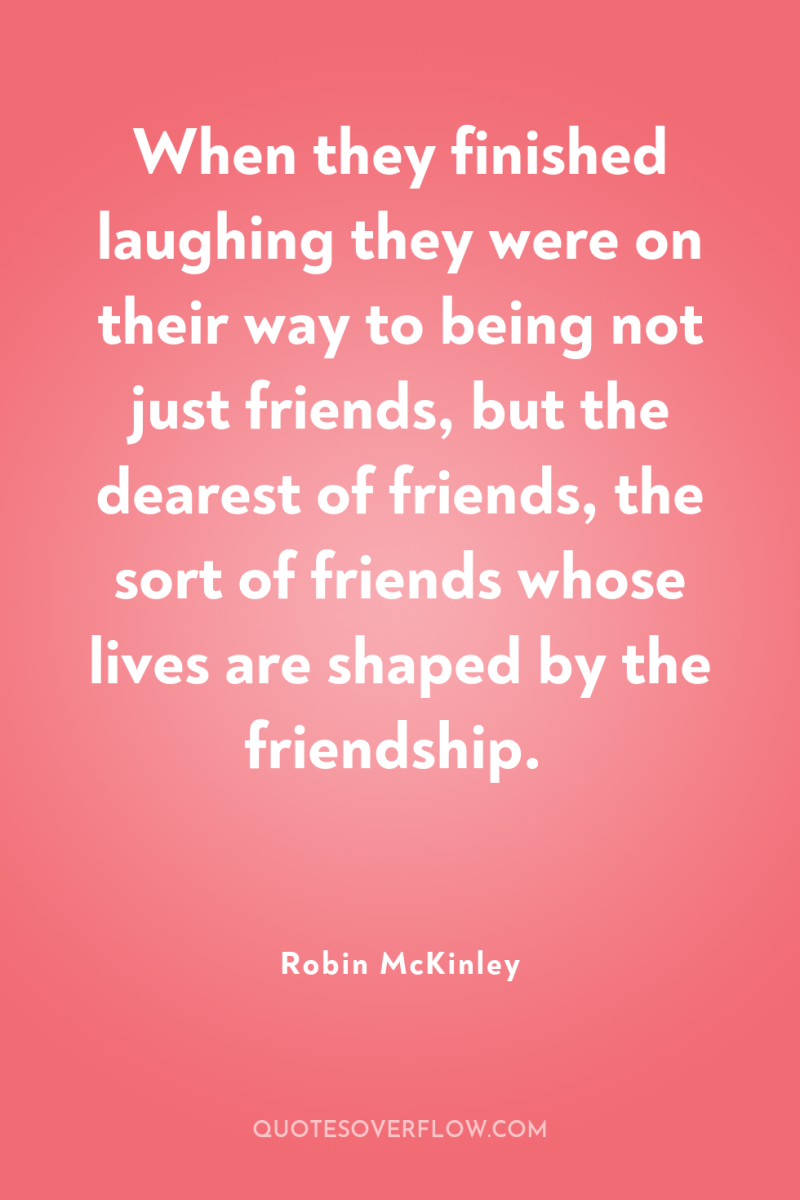1
Oh, why does compassion weaken us?' It doesn't, really .. Somewhere where it all balances out - don't the philosophers have a name for it, the perfect place, the place where the answers live? - if we could go there, you could see it doesn't. It only looks, a little bit, like it does, from here, like an ant at the foot of an oak tree. He doesn't have a clue that it's a tree; it's the beginning of the wall round the world, to him. .Robin McKinley

2
When they finished laughing they were on their way to being not just friends, but the dearest of friends, the sort of friends whose lives are shaped by the friendship.Robin McKinley
3
Cats were often familiars to workers of magic because to anyone used to wrestling with self-willed, wayward, devious magic--which was what all magic was--it was rather soothing to have all the same qualities wrapped up in a small, furry, generally attractive bundle that...might, if it were in a good mood, sit on your knee and purr. Magic never sat on anybody's knee and purred.Robin McKinley
4
(There was an idea much beloved and written about by this country’s philosophers that magic had to do with negotiating the balance between earth and air and water; which is to say that things with legs or wings were out of balance with their earth element by walking around on feet or, worse, flying above the earth in the thin substance of air, obviously entirely unsuitable for the support of solid flesh. The momentum all this inappropriate motion set up in their liquid element unbalanced them further. Spirit, in this system, was equated with the fourth element, fire. All this was generally felt to be a load of rubbish among the people who had to work in the ordinary world for a living, unlike philosophers living in academies. But it was true that a favourite magical trick at fetes was for theatrically-minded fairies to throw bits of chaff or seed-pods or conkers in the air and turn them into things before they struck the ground, and that the trick worked better if the bits of chaff or seed-pods or conkers were wet.) Slower creatures were less susceptible to the whims of wild magic than faster creatures, and creatures that flew were the most susceptible of all. Every sparrow had a delicious memory of having once been a hawk, and while magic didn’t take much interest in caterpillars, butterflies spent so much time being magicked that it was a rare event to see ordinary butterflies without at least an extra set of wings or a few extra frills and iridescences, or bodies like tiny human beings dressed in flower petals. (Fish, which flew through that most dangerous element, water, were believed not to exist. Fishy-looking beings in pools and streams were either hallucinations or other things under some kind of spell, and interfering with, catching, or–most especially–eating fish was strictly forbidden. All swimming was considered magical. Animals seen doing it were assumed to be favourites of a local water-sprite or dangerously insane; humans never tried.).Robin McKinley
5
The magic in that country was so thick and tenacious that it settled over the land like chalk-dust and over floors and shelves like sticky plaster-dust. (House-cleaners in that country earned unusually good wages.) If you lived in that country, you had to de-scale your kettle of its encrustation of magic at least once a week, because if you didn't, you might find yourself pouring hissing snakes or pond slime into your teapot instead of water. (It didn't have to be anything scary or unpleasant, especially in a cheerful household - magic tended to reflect the atmosphere of the place in which it found itself -- but if you want a cup of tea, a cup of lavender-and-gold pansies or ivory thimbles is unsatisfactory.) .Robin McKinley
6
Fairy godmothers?” said the king dubiously. “We’ll have a time getting that past the court council – and the bishop.Robin McKinley